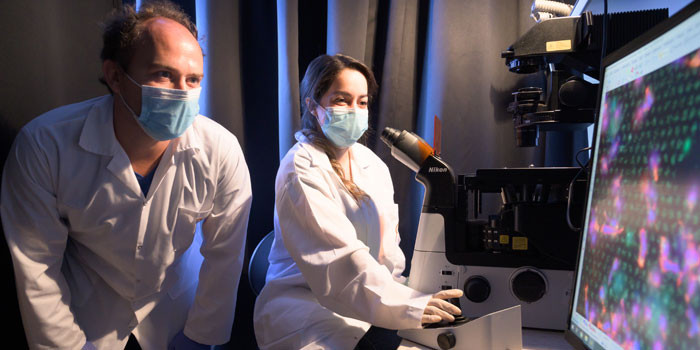Responding to the Call


LATE SUMMER 2020 – Spray Foam Magazine – As a result of a call for proposals for coping with the worldwide Coronavirus pandemic by the Israel Innovation Authority, who is charged with fostering research and development for the state, researchers at the Ben-Gurion University of the Negev (BGU) in Israel are currently working on research and development of a new, safe, antiviral nanocomposite polymer coating. This new anti-Coronavirus coating demonstrates significant potential in preventing active surface infection with SARS-CoV-2 and is planned for roll out some time in the fall of this year.
The research team is led by Professor Angel Porgador, of the BGU Department of Microbiology, Immunology and Genetics and the National Institute for Biotechnology in the Negev (NIBN), and Dr. Mark Schvartzman, in the BGU Department of Materials Engineering, along with Ph.D. students Yariv Greenshpan, Esti Toledo and postdoc Guillaume Le Saux. This exclusive team of scientists is currently developing coatings that could be used in hospitals, healthcare facilities, as well as in public locations such as schools, airports, trains, buses, and cruise ships, where it has been shown that the active virus lasted 17 days on surfaces.
The coatings will contain nanoparticles of safe metal ions and polymers combined with antiviral and anti-microbial properties that will be effective for weeks or even months. In proof-of-concept experiments, the researchers assessed the effectiveness of surfaces coated with nanoparticles of various metals on the infectivity of HIV family lentiviruses in human cells. Findings showed that surfaces coated with copper nanoparticles significantly block virus infection of the cells. The antiviral coatings are based on polymers that contain nanoparticles of copper and other metals and can be painted or sprayed on surfaces. These nanoparticles will enable a controlled release of metal ions onto the coated surface. Studies show that these ions have a strong antiviral effect, which can eradicate virus particles that adhere to the surface. Because the release of ions is extremely slow, the coating can be effective for a long period of time—weeks and even months—and it will reduce the infectivity of the virus particles by more than tenfold.
Professor Angel Porgador states “The current Coronavirus is transmitted not only through droplet spray but also via various surfaces that can transmit the virus from one person to another. It is important to remember that we are developing coatings that will be effective not only against the Coronavirus but also against other viruses, as indicated in our proof of concept experiments, and also against bacteria, so they will be relevant for a wide range of applications.”
According to Dr. Schvartzman, “While current surface disinfection methods rely mostly on substances that are poisonous for people, such as bleach, or on substances that evaporate readily being based on alcohol, the coating that we are developing is based on metals that are toxic for viruses or bacteria, but completely human friendly. He states, “It should be noted that until now using such metals for antiviral applications has encountered significant challenges due to the nature of the metals, such as the tendency to oxidize and corrode. Nanoparticles provide a solution to these obstacles. Another advantage of nanoparticles is the large surface area to volume ratio, which results in an efficient antiviral surface area using a relatively small amount of metal.”
For spray foam and coatings contractors as well as suppliers, it is important to note that the researchers are planning in the future to also incorporate the antiviral components into polyurethane foam. Dr. Schvartzman explains, “The nanocomposite material consists of a polymer matrix and nanotechnological additive that provides the material with an antiviral activity. The additive can be added to any polymer, including polyurethane and polyurea. So, one of our future products will be a foam with antiviral functionality. The future foam can be used by (building and spray foam) contractors. In terms of its application, it will not be different from the materials usually used in construction, such as paints, varnishes, or foams and will not require the user to need any additional PPE.
Professor Porgador also shares, “At the beginning of the outbreak, I was reading a paper testing how long the virus would survive on door handles made of different materials and I found out that copper was definitely the best one, killing the virus within a few hours. Porgador continues. “I called Mark, with whom I have been collaborating for years, and I suggested trying to develop a coating that could be used for all sorts of objects that people touch, from door handles to mezuzot.” (Hebrew for doorposts)
Dr. Schvartzman adds, “We come from different scientific backgrounds, Angel is a biologist who focuses on immunology research, while I’m a nanotechnologist. In recent years, most of my research has focused on developing nanomaterials for biomedical and biological purposes,” Schvartzman pointed out. “Our collaboration has been very fruitful in a synergy between such different fields that is very rare to find.”
The complementary expertise of the scientists involved in this endeavor that is sure to have worldwide implications on the health and safety of the entire global population, proves to be a key for the success of the study. Together with their team of researchers and the support of the Israeli government, this new product will bring aid in the mitigation and containment of COVID-19. According to Doug Seseran, CEO of American Associates - Ben Gurion University of the Negev, this new nanocoating that will limit surface to human transmission is “another fast-developing solution to challenges of the Coronavirus pandemic at BGU.”
- Israel Innovation Authority is is the support arm of the Israeli government, charged with fostering the development of industrial R&D within the State of Israel https://innovationisrael.org.il/en/
- BGN Technologies is the technology company of Ben-Gurion University that is in charge of the technology transfer https://in.bgu.ac.il/en/bgn/Pages/default.aspx
- NIBN is a biotechnological research institute located in Ben-Gurion university
- BGU – Ben Gurion University https://in.bgu.ac.il/en/pages/default.aspx
Disqus website name not provided.









































